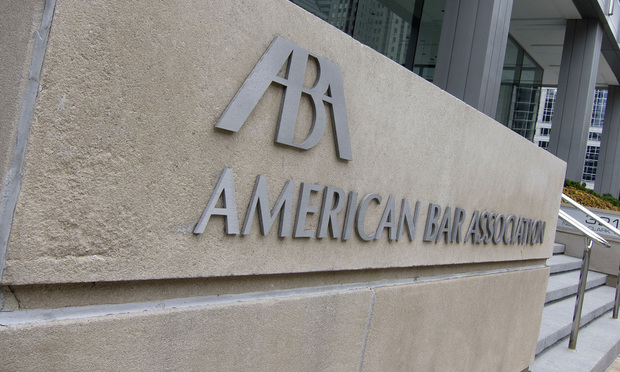ABA, Dept. of Education Battle Over Loan Forgiveness
The American Bar Association says a pro bono project that represents detained immigrants in Texas is facing problems after the U.S. Department of Education said ABA employees don't qualify for public service loan forgiveness.
September 25, 2018 at 04:29 PM
5 minute read
 American Bar Association in Chicago. (Photo: Diego M. Radzinschi/ALM)
American Bar Association in Chicago. (Photo: Diego M. Radzinschi/ALM)
The American Bar Association and the U.S. Department of Education are headed to federal court Wednesday to wrangle over eligibility for the department's popular Public Service Loan Forgiveness program.
The ABA has asked Judge Timothy Kelly of the U.S. District Court for the District of Columbia to issue a preliminary injunction stating that its employees qualify for loan forgiveness—a claim the department refutes. The department has countered that ABA employees aren't eligible for the program because the ABA is not primarily a public service organization, even if certain ABA projects perform public service functions.
At the core of the issue is the ABA's South Texas Pro Bono Asylum Representation Project, known as ProBAR, which provides detained immigrants in Southern Texas with free legal counsel. The ABA claims that recruiting and retaining attorneys for the project has become extremely difficult since the department determined in 2016 that those lawyers are not eligible to have their federal loans forgiven after 10 years, as employees of qualifying public service organizations can.
The ABA claims in court papers that ProBAR is on the brink of collapse as the result of understaffing. The ABA asserts that donors are threatening to pull financial support due to a large number of staff vacancies and that demand is skyrocketing for its services in light of the Trump administration's family separation policy. Hiring and keeping ProBAR attorneys would be much easier if the ABA were deemed a qualifying employer under the public service loan forgiveness program, the ABA claims.
But in its opposition motion, the Education Department argues that the ABA waited too long to seek a preliminary injunction—it first sued over loan forgiveness eligibility in December of 2016—and that a preliminary injunction is premature given that the parties are awaiting a decision on cross-motions for summary judgement. (The case has been on hold for a year after it was transferred to a new judge.)
Moreover, a preliminary injunction stating that ABA employees qualify for public service loan forgiveness would still leave the plaintiffs in limbo, because the case could still be dismissed on summary judgment, the department argues. A preliminary injunction on behalf of the ABA may also have wider implications for the loan forgiveness program, according to the Education Department.
“The ABA's motion is flawed because it does not demonstrate that the ABA will suffer imminent irreparable harm in the absence of preliminary injunctive relief,” reads the Education Department's opposition motion, which was filed by attorneys in the U.S. Department of Justice's Civil Division. “Though the ABA focuses on the alleged harm suffered by one of its projects, it never asserts that the organization as a whole is suffering irreparable injury.”
The ABA counters that ProBAR's precarious position provides ample reason for the court to step in an immediately clarify that ABA employees do, in fact, qualify for public service loan forgiveness.
“[The Education Department's opposition motion] displays a callous indifference toward the plight of public servant student loan borrowers and their employers and to the ABA's inability to provide crucial public interest legal services to a vulnerable population of immigrants—including children—in immigration proceedings,” reads a brief filed by the ABA, which is represented by attorneys from Ropes & Gray.
The ABA originally filed suit on behalf of itself and four plaintiffs who work for ProBAR and initially believed they qualified for public service loan forgiveness, only to later be told by the Education Department that they do not. In several cases, the Education Department itself told the borrowers that they qualified, only to reverse course.
Under the Public Service Loan Forgiveness Program, which was enacted in 2007 during George W. Bush's presidency, federal borrowers who work for 10 years at qualified public service organizations and make their required loan payments for that period are eligible to have their loan balances forgiven. The program is intended to spur more people to take public service jobs, which often pay less than private sector ones.
But the Education Department does not make final determinations about qualified employment until borrowers apply to have their loans forgiven—that is, after 10 years of payments. Borrowers may file annual certification forms with the department to clarify their intention to apply for loan forgiveness, but no decisions on eligibility are final until 10 years of payments, under Education Department policy.
That timeline is yet another reason that the education department has asked the court to dismiss the ABA's suit, because no final determination has been reached in the case of the ABA plaintiffs and that their lawsuit is premature.
But ProBAR's immediate future is dire, according to the ABA's preliminary injunction motion.
“Virtually all of the attorneys to have left ProBAR in recent years, and others who have turned down job offers from ProBAR, have done so for the same reason: the uncertainty regarding ABA employees' eligibility for the PSLF program,” it reads. “Many attorneys can afford to work for public interest organizations only if loan forgiveness under the PSLF program—after ten years of working for the organization and making the required payments on the loans—is assured.”
This content has been archived. It is available through our partners, LexisNexis® and Bloomberg Law.
To view this content, please continue to their sites.
Not a Lexis Subscriber?
Subscribe Now
Not a Bloomberg Law Subscriber?
Subscribe Now
NOT FOR REPRINT
© 2025 ALM Global, LLC, All Rights Reserved. Request academic re-use from www.copyright.com. All other uses, submit a request to [email protected]. For more information visit Asset & Logo Licensing.
You Might Like
View All
Read the Document: DOJ Releases Ex-Special Counsel's Report Explaining Trump Prosecutions
3 minute read
Houston Trial Lawyer Mary-Olga Lovett Leaves King & Spalding to Open Boutique
3 minute read
The Gospel According to Paxton? AG Fights Religious Group Over Migrants
6 minute read
Trending Stories
Who Got The Work
J. Brugh Lower of Gibbons has entered an appearance for industrial equipment supplier Devco Corporation in a pending trademark infringement lawsuit. The suit, accusing the defendant of selling knock-off Graco products, was filed Dec. 18 in New Jersey District Court by Rivkin Radler on behalf of Graco Inc. and Graco Minnesota. The case, assigned to U.S. District Judge Zahid N. Quraishi, is 3:24-cv-11294, Graco Inc. et al v. Devco Corporation.
Who Got The Work
Rebecca Maller-Stein and Kent A. Yalowitz of Arnold & Porter Kaye Scholer have entered their appearances for Hanaco Venture Capital and its executives, Lior Prosor and David Frankel, in a pending securities lawsuit. The action, filed on Dec. 24 in New York Southern District Court by Zell, Aron & Co. on behalf of Goldeneye Advisors, accuses the defendants of negligently and fraudulently managing the plaintiff's $1 million investment. The case, assigned to U.S. District Judge Vernon S. Broderick, is 1:24-cv-09918, Goldeneye Advisors, LLC v. Hanaco Venture Capital, Ltd. et al.
Who Got The Work
Attorneys from A&O Shearman has stepped in as defense counsel for Toronto-Dominion Bank and other defendants in a pending securities class action. The suit, filed Dec. 11 in New York Southern District Court by Bleichmar Fonti & Auld, accuses the defendants of concealing the bank's 'pervasive' deficiencies in regards to its compliance with the Bank Secrecy Act and the quality of its anti-money laundering controls. The case, assigned to U.S. District Judge Arun Subramanian, is 1:24-cv-09445, Gonzalez v. The Toronto-Dominion Bank et al.
Who Got The Work
Crown Castle International, a Pennsylvania company providing shared communications infrastructure, has turned to Luke D. Wolf of Gordon Rees Scully Mansukhani to fend off a pending breach-of-contract lawsuit. The court action, filed Nov. 25 in Michigan Eastern District Court by Hooper Hathaway PC on behalf of The Town Residences LLC, accuses Crown Castle of failing to transfer approximately $30,000 in utility payments from T-Mobile in breach of a roof-top lease and assignment agreement. The case, assigned to U.S. District Judge Susan K. Declercq, is 2:24-cv-13131, The Town Residences LLC v. T-Mobile US, Inc. et al.
Who Got The Work
Wilfred P. Coronato and Daniel M. Schwartz of McCarter & English have stepped in as defense counsel to Electrolux Home Products Inc. in a pending product liability lawsuit. The court action, filed Nov. 26 in New York Eastern District Court by Poulos Lopiccolo PC and Nagel Rice LLP on behalf of David Stern, alleges that the defendant's refrigerators’ drawers and shelving repeatedly break and fall apart within months after purchase. The case, assigned to U.S. District Judge Joan M. Azrack, is 2:24-cv-08204, Stern v. Electrolux Home Products, Inc.
Featured Firms
Law Offices of Gary Martin Hays & Associates, P.C.
(470) 294-1674
Law Offices of Mark E. Salomone
(857) 444-6468
Smith & Hassler
(713) 739-1250






